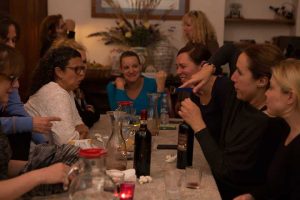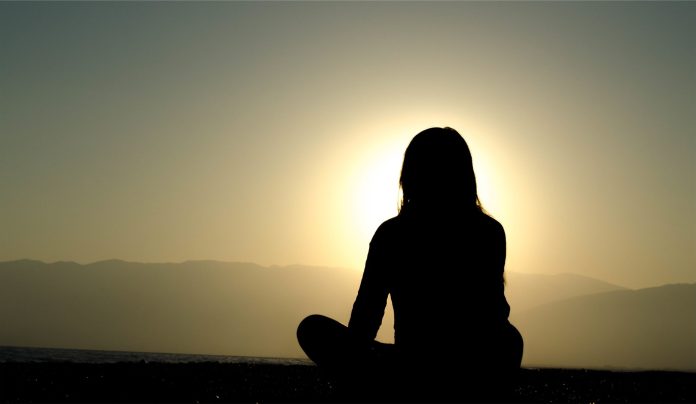By Mary-Frances Makichen
I’ve been meditating for a long time now—something like 20+ years. There are some days meditation is amazing, even transcendent. I’ll come away from it feeling completely connected to the larger universe that surrounds me. Sometimes it’s like pulling teeth and I’m left with a distinct feeling of unrest and irritation. Either way I keep meditating. I sit on a cushion in front of my meditation space and I listen to the sound of my breath—the inhale and exhale of that one moment in time.
Over six years ago tragedy struck and my nonsmoking husband was diagnosed with Stage 4 lung cancer. There is no Stage 5. He died 13 months later after a brave battle, radiation, chemotherapy and two stints in the hospital. He was a meditation teacher, intuitive and philosopher. Meditation was an important part of both of our lives.
His death was devastating for me. I lost my best friend, fellow traveler, lover and husband. The hole in my life was so big that I wasn’t sure it could ever be closed, patched or bridged. After he died, I was desperate to understand why this had happened and to find some kind of solace. It seemed logical that shortly after his death I should start meditating again. I hoped that meditation would help me deal with the grief and stress that filled my world then.
I remember sitting cross-legged on the seat cushion I use to meditate—it’s from a favorite chair that was discarded long ago. After two shallow, ragged breaths I burst into tears and cried for a long time. I tried again the next day and the same thing happened. As soon as I would try to breathe and focus on my breath the tears would overwhelm me like water gushing out of a cracked dam. It wasn’t a pretty, petite kind of crying either. It was the full on, ugly face, gut-wrenching sobbing—the kind that I worried would never end.
Meditation, or the act of trying to meditate, became something I dreaded. I can honestly say that at first I never felt better afterwards. I didn’t feel calm or accepting of my husband’s death just horribly tired and old, as if I had aged 100 years in just one. When you already feel like an open, raw nerve being made more aware of it definitely doesn’t feel good. There were days that I couldn’t stand the thought of even trying to sit down to meditate. When I could manage it the same thing always happened—I’d get through a couple of breaths and then just fall apart crying.
For some crazy reason, and despite the bouts of falling apart and crying, I kept coming back to my meditation practice. The familiarity, the habit of meditation, that had been a part of my life for so many years, wouldn’t let me go entirely. Some people may perceive meditation as a passive activity because of the internal focus—you sit, you breathe, you pay attention. For me it wasn’t passive at all. It was a scary, vulnerable place that I could choose to visit. I could actively make the choice, each day, to sit down and meditate. I couldn’t control my husband dying, but in the aftermath of his death, I could control how I reacted to it. I could choose and reaffirm my commitment to meditation. In the face of grief and death that may not seem like an earth-shattering decision. For me it was big. I was choosing to not entirely lose all of the things that were important to me along with my husband.
Slowly, after many, many months, I was astonished one day to realize that I didn’t cry anymore when I sat in meditation. I might tear up, but even that wasn’t happening nearly as often. I could actually sit and breathe and be in the moment without being completely overwhelmed by emotions. That was a good day.
It took the passage of time for me to understand that every day I sat and cried when I tried to meditate wasn’t a day that I failed. It wasn’t a day that meditation let me down or I let myself down. Sitting on my old familiar cushion, taking a breath or two, and then bursting into tears was my meditation. It was exactly the one I needed to help process my grief at that time and when it was no longer what I needed, it changed.



This is the first time I have seen someone address the fear of meditation. I never followed through as the writer, and to this day I am fearful of the raw emotions that may be released–like a dam busting. I have never properly grieved, just marched on day by day. This story has given me the strength to try again. Thank you!
Your bravery to keep coming back to meditation is something to learn from. To be quiet and self-aware amidst so much grief and struggle is so incredibly hard. I struggle with it often. Thank you for your words.
I find this very moving–and very real, very practical. So often when people talk about meditation they seem to think it’s always about peace and always about joy, and of course, it isn’t. It’s a practice, and so often a slog, as you say; and yet it also makes us available to joy, and available to peace. Thank you for this reflection.
Thank you. I am going through this right now. Your words help.